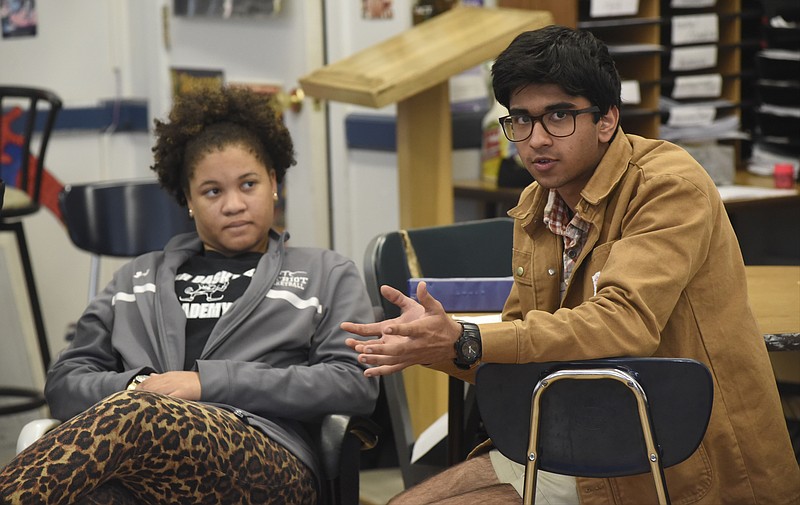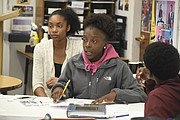More Info
For more information visit www.chatt2.org
Students say they want to see more opportunities in every school across Hamilton County.
Sitting around tables and in circles on the floor Wednesday, students at Chattanooga School for the Arts and Sciences discussed the Chattanooga 2.0 report and brainstormed solutions to the problems facing many of the county's public schools.
The Chattanooga 2.0 report, released in December, offers a sobering picture of education in Hamilton County, shining a spotlight on the number of students graduating from high school not prepared to enter the workforce. And for the first time since the report was released and groups of adults began meeting to discuss how the county should tackle the problems, a large group of students discussed potential solutions.
"This report is relevant to us," said Parth Doshi, an eleventh grader at CSAS. "The report shows things affecting us now and our community in the future."
Doshi said he is proud of his school, which is one of the top-performing high schools in the district, but he wishes all schools were providing students the same opportunities and preparing them for jobs after graduation.
Just a table away, Doshi's classmate Olivia Buchanan said she thinks students need to be exposed to potential careers while in school to better prepare them for one.
"If businesses give us an opportunity while we're still here learning we'll have a better foundation for getting those jobs in the future," she said.
Buchanan said one of the main points of the Chattanooga 2.0 report is that 65 percent of students in Hamilton County aren't receiving the post-secondary training needed to hold livable-wage jobs here, and that could change if the community becomes more involved.
She and a few classmates talked about how businesses could offer career shadowing days and internship opportunities. They mentioned it would be helpful if community members and alumni came to schools more often and shared information about their professions.
Before discussing such solutions Wednesday, all students in grades 6 through 8 at CSAS studied the report and spent two class periods talking about its findings.
Last week students voiced disappointment in how Hamilton County's public schools are testing below the state average in most subject areas, and that black students are more likely to attend low-performing schools. Students also talked about the potential mentioned in the report, as an influx of jobs are said to be arriving in the county.
On Wednesday, Amy Freeman, a 6th grade language arts and social studies teacher leading one of the discussion groups, said it's important for students to be a part of the problem solving when it comes to education.
"Kids are willing to think again about things we adults may be jaded about," she said.
Looking around her classroom of students busy talking about solutions, Freeman said she was proud of the discussion the 6th graders were able to have about issues directly affecting them.
In the corner of Freeman's classroom, three girls talked about ways the community can help parents who have to leave their children alone while they work.
The girls said the report talked about the importance of children being prepared to enter kindergarten, and they thought that kids being left at home while their parents worked put them at a disadvantage to those who receive more attention.
"It's not the parents' or kids' fault that the adults have to work," Caryle Boykin told her group.
The girls said ways to combat that disadvantage are to raise the minimum wage for those parents so they can work fewer hours and provide day care at workplaces so that the kids can still get attention.
In a classroom a floor above, 11th graders talked about how to better prepare students to enter kindergarten. They mentioned providing quality pre-K to all kids across the county and educating parents on the importance of early childhood development.
Kevin Aslinger, a high school English teacher facilitating that discussion, said it's always encouraging when his students reach the last day of discussion on a topic and are able to pull together everything they've learned.
"Student voice and thought is important," he said. "It's good for them to think about what the community can do to help all schools."
Contact staff writer Kendi Anderson at kendi.anderson@timesfreepress.com or 423-757-6592. Follow on twitter @kendi_and.

